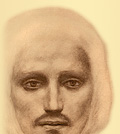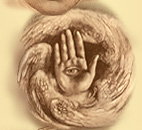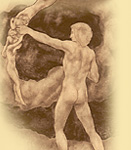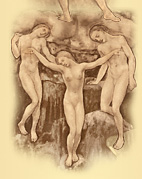    |
|
 If this is indeed the hour in which I lift up my lantern, it is If this is indeed the hour in which I lift up my lantern, it is
 not my flame that shall burn therein. not my flame that shall burn therein.
…The guardian of the night shall fill it with oil and he shall
 light it also light it also
 — from The Coming of the Ship — from The Coming of the Ship |
|
The prophets whom we revere, whose words have been recorded and passed down to help illumine and inspire later generations, were not the creators of truths that did not exist before they answered God’s call. They were, and are, more like scientists who can only uncover and explain laws already in operation.
Which is why, insofar as any prophet speaks Truth, he or she is regarded as a “mouthpiece” for The Divine. The Universe is simply revealing its secrets through human lips, as it would expose itself through the lenses of microscopes and telescopes and in the mathematical formulas of later luminaries. The ancients acknowledged this process of “revelation” in the titles they applied to such people—Nabi in Hebrew, for example, or in Arabic, Nabiyy, both of which indicate their roles as “spokespersons.”
Not that prophets had no special talents of their own, no independent qualities that made them especially suited for their job. In most cases, their longing for justice and their spiritual sensitivity opened them to truths others could not see so clearly, if at all. More importantly, they had the courage to proclaim those truths, often in opposition to the status quo and despite the hostility and outright threats of powerful leaders. It’s no wonder so many prophets were scorned, or even put to death, for speaking out.
Nor is it any wonder Almustafa describes the counsel he prepares to offer Orphalese as a “lantern” he lifts in the darkness, a lantern whose flame is ignited and fueled not by him, but by “the guardian” whose Light a select few are allowed to hold aloft during their appointed “hour,” thereby helping others to see in the darkness . . . and, if their eyes remain open, helping to illumine their own path. |
|
|
Reflections © Mark S. Haskett, 2010-2011. Words and artwork from Kahlil Gibran’s THE PROPHET are administered by The Gibran National Committee, Beirut, Lebanon, and used with their kind permission.
|
|
To receive a weekly e-mail featuring a selected quotation from The Prophet, along with a reflection on its meaning and implications for our lives, please SIGN UP HERE.
|
|



